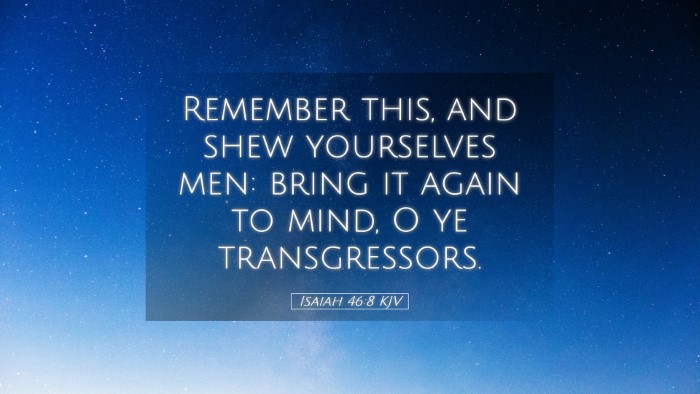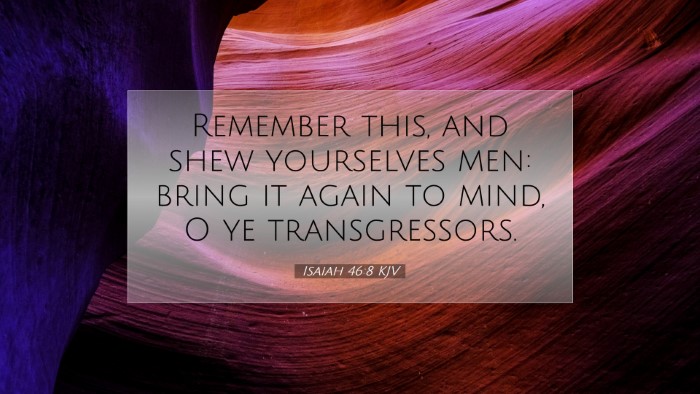Commentary on Isaiah 46:8
Verse: "Remember this, and show yourselves men: bring it again to mind, O ye transgressors."
Introduction
The verse Isaiah 46:8 calls the people of Israel to remember and reflect upon their identity and responsibilities as transgressors. This exhortation comes within the broader context of God's sovereignty and the futility of idolatry, emphasizing His power and the reality of human sinfulness.
Contextual Overview
Isaiah is writing during a time when Israel is surrounded by spiritual confusion and the allure of foreign idols. The juxtaposition of God's omnipotence against the weakness of false gods is a prevailing theme in Isaiah. This chapter serves to remind the people of their divine calling and the importance of acknowledging their sins in the light of God's greatness.
Commentary Insights
Matthew Henry's Insights
Matthew Henry emphasizes the call to "remember" as a critical step for the people of Israel. He notes:
- The Importance of Memory: Henry suggests that memory serves as a vital means of spiritual reflection. It compels the people to confront their realities—both their failings and God's faithfulness.
- Call to Accountability: The phrase "show yourselves men" denotes a call to maturity and responsibility. It invites the people to rise above their weaknesses and take ownership of their collective identity as God’s chosen people.
- Addressing Transgressors: By addressing the "transgressors," it is evident that God is confronting His people with their sins. This serves as both a rebuke and an invitation toward repentance.
Albert Barnes' Insights
Albert Barnes offers a theological interpretation that enhances the understanding of the verse:
- Divine Sovereignty: Barnes points out that God's sovereignty is intertwined with His mercy. The people are encouraged to remember their sins not merely for condemnation but to appreciate God's grace in their lives.
- Contrast with Idolatry: He highlights the contrast between the true God and idols, suggesting that this remembrance is crucial to understanding the futility of depending on false gods.
- Encouragement to Return: Barnes emphasizes the interpretive nuance of 'show yourselves men.' This phrase can also imply a call to return to strength and integrity in their faith and walk with God.
Adam Clarke's Insights
Adam Clarke provides a contextual approach that places the verse within the historical narrative of Israel:
- Historical Reflection: Clarke urges the readers to consider Israel's storied history, marked by rebellion and divine intervention. Remembering past transgressions serves as a guide for future behavior.
- Reminder of God's Promises: The call to remember must include God's faithfulness throughout Israel’s history, reminding them of His continuous redemptive work.
- Exhortation to Change: He asserts that the remembrance should lead to genuine change, calling the people to a deeper commitment to God’s commands and covenant.
The Anthropological Perspective
This verse also poses important questions about human identity and accountability:
- Identity as God's People: The call to remember is a challenge to reclaim their identity rooted in divine purpose, urging them to live out their calling with integrity.
- Awareness of Sin: Acknowledging sin is the first step towards experiencing genuine transformation and restoration. The people are reminded that recognizing transgressions is not merely about guilt but about the opportunity for redemption.
- The Role of Men in Faith: This call to "manhood" in faith invokes a sense of strength, courage, and responsibility amongst believers—a call to lead and guide in righteousness.
Theological Implications
The implications of Isaiah 46:8 extend beyond the historical context into modern faith practice:
- Memory as a Spiritual Discipline: Christians today are encouraged to practice remembrance as a spiritual discipline, reflecting on God’s past works in their lives and the lives of their communities.
- Collective Responsibility: The church, as the body of believers, is called to confront both individual and collective transgressions, fostering an environment of confession and accountability.
- Hope Through Repentance: Understanding that repentance brings hope and restoration serves as a crucial aspect of Christian theology, encouraging conditions for spiritual renewal.
Conclusion
Isaiah 46:8 serves as a critical reminder for both Israel's ancient context and today's believers. It calls for a sober reflection on personal and communal failings while simultaneously pointing towards God's grace and the hope found in repentance. For pastors, students, theologians, and Bible scholars, this verse invites deep exploration into the dynamics of remembrance, identity, and accountability within the faith community.


